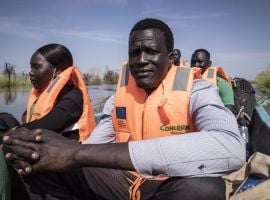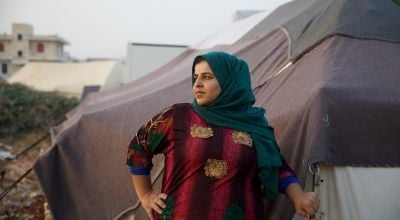
Knowledge Hub
Young children listen intently as their teacher leads a maths class. Their art is proudly displayed around the classroom, colourful signs illustrate the alphabet. So far, so normal, except this is a non-formal education centre for displaced children in Syria, who have been through incredible trauma during their short lives.
Syria has now been in conflict for twelve years and Concern Worldwide’s Education Coordinator in Northern Syria (NS) Robert* explains how the programme is vital to ensure there isn’t a “lost generation” of Syrian people missing out on education and all of the opportunities it presents. He said education is key to support individuals and the wider society to recover after conflict.
Over 30% of Syria’s schools have been destroyed following years of conflict, and places in those schools that remain in operation are in high demand.
Concern’s Education Programme in NS started in 2018 with a non-formal education (NFE) centre for children who are out of school and unable to attend a formal school. There are now 11 NFE centres in the region, reaching over 3,000 children each year.
The NFE centres are divided to teach children aged between eight and 13 to primary level, and older children who are aged between 14 and 17, who are also at a primary level of education but are too old to attend classes with the younger children.
The NFE programme is an accelerated programme where children can learn the basic literacy and numeracy skills to rejoin a formal primary school at the end of the course. The programme also provides homework support for children who have graduated to formal schools and are at risk of dropping out.
Supporting children’s emotional well-being
A key aspect of the NFE programme, which receives funding from the European Union (EU), is the provision of social emotional learning support, which Robert says is vital for the pupil’s emotional well-being.
He explained: “The children learn how to communicate, to talk about their emotions, to work with others, to work on their relationships, that helps them to express their emotions and their feelings. This helps them to learn better but this also addresses some of the impacts of the legacies of the trauma that they might have gone through.
We try to combine literacy, numeracy and social emotional learning so that we look after the holistic interests of the child's whole well-being in an integrated way.
When a pupil enters the programme, the facilitators carry out simple tests using child-friendly questions to ask the child about how they would respond in a hypothetical situation, the same questions are asked when they graduate, and the results are incredible.
Robert says: “What we see is at the beginning when we ask those questions, children are quite angry and they're quite sad and they're not calm and they will tend to, if they're presented with a situation which might involve conflict, to withdraw or to even be physically or emotionally or verbally aggressive.
“And when we do the same tests when they're about to leave the programme, we find that they're much calmer, they're much less likely to use physical or verbal aggression as a strategy for dealing with their relationships. They're much less angry, and they seem to be able to manage their emotions in a much more positive and controlled way.”
"Everybody wants the best for their children"
The children's caregivers also attend monthly sessions at the NFE centres where they can learn about the emotional needs of the children, as well as discuss any caregiving difficulties they may be experiencing.
Robert spoke about how important education is to many of the caregivers who attend the NFE centres.
“I think what we're seeing now is a whole lost generation, the war started 12 years ago, so many children who were about to go to school then missed out their education entirely.
“They're at the age now when they are beginning to have children and they will have felt the effect of not being educated. They will have seen that they don't have the opportunities available to them now. Which their parents might have had, and they certainly see that for their children as well. Everybody wants the best for their children, and education is seen as being the best way of getting a well-paid job.”
As well as a shortage of schools and teachers, another barrier preventing children from receiving an education is that the economy is facing an economic downturn and many families are struggling to make ends meet and are having to make tough decisions to meet their basic needs.

Robert said: “The economy has been decimated, and it's getting worse now even because of a variety of different things. The cholera outbreak. The fall in the value of the Syrian pound, which put prices up far too high. The lack of employment opportunities.
“Unfortunately, we see that child labour, particularly for boys in the market and for girls at home, is increasing at a very rapid rate so, much as caregivers might want to send their children to school and as much as children might want to go to school, they simply can't afford losing the labour of the child to the family income.
Concern Worldwide is looking into the possibility to providing services through mobile classrooms and modern technology as a solution to current barriers and to help young people receive their education in NS.
“We're getting to the point now where we want children to go into the formal sector, but there's just not enough places. There's no more free space, so we need to kind of think a little bit differently.
“We could move to smaller displaced communities. At the moment, we tend to focus our programmes where there are the most out-of-school children. But there are lots and lots of other smaller communities of displaced people... we could have a single temporary classroom with tablets and maybe one or two facilitators, so we would be able to be much more mobile, flexible, adaptable to particular circumstances in which people find themselves."
"The world's attention has long gone from Syria"
Robert spoke of his pride in the programme and the teachers at the NFE centres, who make it happen each day.
“What I'm proud of for the programme is that we have the most incredible facilitation team of people who themselves are displaced, who have gone through incredible trauma and yet they are able to bring this incredible joy of learning to children. And they seem to have inexhaustible energy supplies and good ideas for teaching. When you see it in the classroom, that dynamic happening between the teachers and the children, that's the magic.”

As new global crises grab the world’s attention and dominate media headlines, Robert stressed the importance of not forgetting about the continuing crisis in Syria.
He said: “This is a population which has undergone extraordinary trauma and is continuing to do so but the world's attention has long gone from Syria.
“We should pay attention to those emergencies, but with every other emergency that happens, then Syria slips a little bit further down the list and the funding slips, and we can offer fewer programmes to fewer children. And yet there are still hundreds of thousands of children out of school in northern Syria.
“I think it's just a plea to the world not to forget about Syria. We shouldn't forget about any emergency anywhere. Everywhere is equally important, but we need to make sure that nobody becomes that lost generation again.”
*Name has been changed





